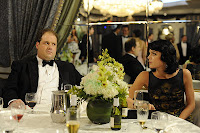Wry, bittersweet "Dark Horse" a dark horse itself
Dark Horse (2012)
84 min., not rated.
Long live Dawn Wiener! Ever since 1995's unflinchingly sharp, uncomfortably spot-on, and altogether insightful "Welcome to the Dollhouse," writer-director Todd Solondz (2010's "Life During Wartime") has specialized in a distinctly outré brand of tar-black, satirical comedies intermingled with heartbreaking drama. They tend to feature flawed, messed-up, human characters that their creator arguably has affection and compassion for, warts and all. While his previous work has focused on miserable topics as pedophilia, rape, and overall unhappiness in courageously harsh and amusingly ironic ways, his latest, "Dark Horse," is a wryly observed character study and critique of arrested development that follows one man who just wants to be accepted by other people.
The man in question is not exactly someone you'd want to grab a beer with or a character we can instantly root for. His name is Abe (Jordan Gelber), a portly, balding 35-year-old schlub who freeloads, still living in New Jersey with his parents (Mia Farrow, Christopher Walken). He works for his father's real estate company, but blames others and ends up leaving work early with a temper most of the time. Adding to his delusional state of unironic self-aggrandizing, Abe drives a flashy yellow Hummer and constantly listens to upbeat, inspirational pop songs. The fact that he never finished college automatically makes him inferior to his successful doctor brother Richard (Justin Bartha), but Abe would rather price out ThunderCats action figures online than get any work done anyway. At a wedding, Abe meets Miranda (Selma Blair), a striking but depressed young woman, who's also alone at the reception. She's clearly not interested in him and is more than a bit reluctant to give away her phone number. After forgetting about their date, Miranda apologetically invites Abe into her parents' house. They hardly know each other, but Abe proposes to her, and Miranda later accepts because she has no more happiness left in her, just Hepatitis B.
In a rare moment of clarity, Abe says, "We're all horrible people." Even if Solondz's characters are never appealing at the onset, they are real and empathetic, never one-dimensionally horrible, and he never judges the poor souls. It's clear that Solondz has real compassion for his "dark horse." Abe may be spoiled, off-putting, and often obnoxious (read: horrible), but Gelber seizes the role and finds Abe's lonely center. The Broadway actor is a genuine talent, a sort-of Paul Giamatti in looks and range, who can make us care about a pathetic sadsack. From his delicate, complex performance, this loser of a character shows a touch of humanity and self-pity that you start to feel sorry for him.
Lending Gelber a hand is the strong supporting work by more-than-capable actors who treat their characters with shades of gray. Farrow is sweet and touching as Abe's dear mother, who gladly plays backgammon with her son but, in one of the fantasy interludes, tells him that they've "written you off as a failure years ago." Walken, sporting a toupee and pants belted past his navel, is also excellent as Abe's cold, disappointed father. Apparently reprising her character Miranda (formerly Vi) from 2001's "Storytelling," Blair's sad-eyed turn is terrifically deadpan ("Oh my god, that wasn't horrible," she says after sharing her first kiss with Abe). Last but definitely not least, the always-wonderful Donna Murphy gets to play different facets, alternately a mousy wallflower and an overly confident man-eater, as Dad's good-hearted secretary Marie, who has a soft spot for Abe.
Early on in the film, Abe imagines said fantasy interactions, mostly with Marie being the voice of reason and then putting him in his place. These dreamscapes then take over after a key moment and redefine the rest of the story. It's there that "Dark Horse" throws us off balance but brings us closer to Abe. Despite his blowhard attitude and short temper when he doesn't get his way, Abe says he sees himself with a frontrunner mentality but plays on his dark-horse qualities. "Dark Horse" turns out to be a dark horse itself.
Truly Solondzian but softer than expected, "Dark Horse" isn't without Solondz's cruel streak, then achieves an unexpected poignancy down the line. Still, it goes without saying that, like all of his films, this one, too, will probably be an acquired taste — don't expect to be wrapped up in a warm and fuzzy blanket. Solondz never has any use for happy endings; what he does is bittersweet and tricky, opening with a bleakly funny vision of despair and then letting in a sliver of tenderness to strike an emotional chord. We cringe, we laugh, and we feel, and in that order.
Grade: B +










Comments
Post a Comment